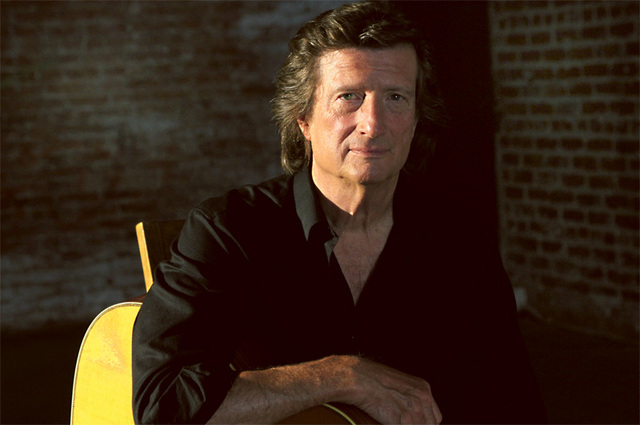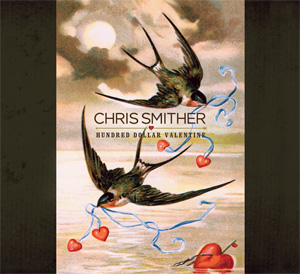Singer/songwriter Chris Smither doesn’t need much to cast his spell, just his blue guitar and a miked particleboard so his tapping foot can keep time. “You know, if my time is off, nothing really makes any sense,” he says. The blues is his preferred charm, and he’s a master at pulling listeners deep into themselves with that simple form.He’s touring on the strength of his latest recording, Hundred Dollar Valentine (Signature Sounds), his first album of entirely self-penned material. Like all those that came before, it addresses elephant-in-the-room questions—mortality, the void, impermanence—magicking meaning out of conundrums with Zen-like humor.He called from Massachusetts, where he lives with his wife and daughter. After a brief chat about the state of the Red Sox (“Are you trying to make me hurt?” he wanted to know), we got to the music.You spend a lot of time on this recording pondering the imponderables that I think most of us prefer to ignore most of the time.Yeah, well, it’s the big ones, you know. It’s the ones that are always there. Someone’s got to poke away at them.You paint a pretty bleak picture: You’re never going to get an answer to the question “Why?” and the question’s probably not even relevant. You’re only here briefly, and happiness is fleeting, if it’s ever attainable. It’s bleak, but you don’t sound desperate, and I feel better after I listen. How do you do that?I had [an interview] in New York with a kid from Mother Jones. He said, “Chris, I was reading stuff that people write about you, and you’re constantly referred to as this sort of mildly depressed, semi-cynical philosopher. … If you had to describe yourself, what would you call it in one word?” I said, “Hopeful.” What I try to convey is that all the things that you think are going to give you answers are not going to give you answers, but you don’t need those answers. Life is what you bring to it. … I talk about the illusion of meaning in the song “All We Need to Know.” I try to express that I understand why people are deluded into thinking that there’s design and there’s meaning behind the whole thing. But it’s just that: It’s an illusion. But, of course, that’s my opinion.The Buddha would probably agree with you.Well, yeah, that’s certainly what it all relates back to in my personal case.You cover yourself on a couple of tracks, doing tunes you wrote long ago. What was that like for you?To me, the best aspect of that was realizing how well they hold up. There are a few of my songs from the early days that I just wouldn’t write them now, but these hold up. They’re still definitely what I’d call Chris Smither songs. … I was a little surprised they didn’t change a little more. My rhythm, my time is better. I think there’s a certain expressiveness in the voice. I think, over the years, it’s not so much that my voice has gotten better. I just think it’s a lot more believable than it used to be. I believe it myself. It’s sounded pretty believable to me for as long as I’ve known you.Oh, good.Unfortunately, that wasn’t until 2004.Well, 2004 is about the time that I started thinking my singing had evolved to a point that I felt I’d been looking for my whole life.The blues is a really simple form. How is it that it gets so close to the bone?Whew. Well, the simplicity is part of it. There’s just enough room. You can say the same thing about a sonnet. You know, it’s only 14 lines with a very defined rhyme scheme, but how is it that some of the most memorable poems in the language are written in that form? It’s a question of having just enough room. It reminds me of—I forget who the billionaire was—when he was talking about how much money to leave his kids, and he says, “You leave them enough to do something but not enough to do nothing.” There’s a fine little line in there, having just enough maneuverability to actually be able to do something and not enough that you can just afford to squander all the opportunity.“All We Need to Know” … This song almost brings me to tears.To me, I think it’s one of the two most powerful songs on the record. Part of it is the orchestration, the string section. It inspires me with this vision of the universe—you know, huge colliding galaxies and gas clouds and things swirling in time and space. … And it’s exhausting. But I love it, and I’m particularly pleased that you like that one.You said two songs. What’s the other one?I like “Place in Line.” It’s a different feel. It doesn’t have the power, I don’t think, but, at the same time, there’s a completeness to it, all the little ends tied up. There’s nothing kind of loose and hanging around—just as an exercise in songwriting art.Well, Chris, I think I have what I need. We’re looking forward to seeing you live again.Thank you for being merciful about the Red Sox.
Chris Smither
Saturday, Sept. 29, 7:30 p.m.
Outpost Performance Space
210 Yale SE, 268-0044
Tickets: $30/$25 members and students
outpostspace.orgsmither.com











